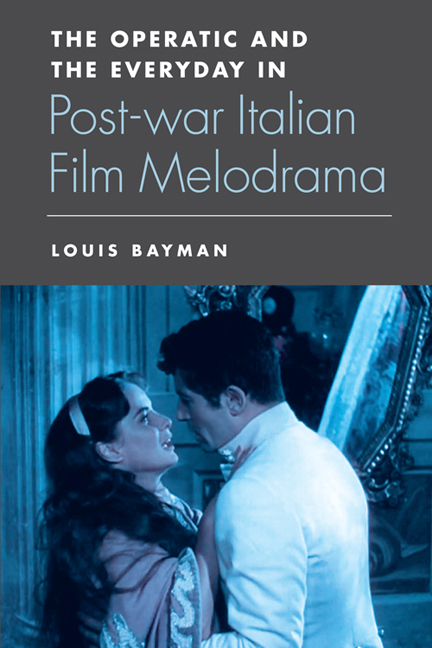Chapter 3
Published online by Cambridge University Press: 05 August 2016
Summary
We have been concerned up to now with the significance of melodrama in the context of Italian cinema. The significance of melodramma, at least in the context of the Italian dictionary, takes us further back and to other artistic realms, for the word is synonymous with ‘opera’ and ‘melodrama’. Melos is Greek for ‘melody’, and the term was devised for the combination of music and drama found in the first mélodrames (Rousseau's Pygmalion (1762/70) is credited as the first full version). These dramas belonged to the late eighteenthcentury French stage and alternated spoken and musical performance in a modern imagination of what Ancient Greek theatre was like.
The accompaniment of music to drama confers various cultural associations, in particular the linkage of music with emotional emphasis and elevation. In the historical account given by Jay Grout (1965), in Greek drama, music was used intermittently to increase the magnitude of the drama, and, implying a heavier emotional function belonging to the music, was present more often in tragedy than comedy. In liturgies and mystery plays the musicians were held on a higher level representing paradise, in another linkage of music with elevation. The prominence of music, or a sense of a stylistic musicality (see Elsaesser 1987, to be discussed further below), is central to conceptions of melodrama. Italy offers a special case because of the historical prevalence of opera in its stage drama, and the consequent belief that the operatic indicates a deeply Italianate expressivity.
I OPERA AND CINEMA
Film in Italy has been a lead instrument for the mass diffusion of opera, as cineopera, films arising from opera, twice saved the industry from crisis, at the onset of sound in the 1930s and after the destruction wrought on the industry by World War II. In straitened times, these costume dramas enabled a nation fresh from the ‘nightmare of the war’ to be taken
into a higher realm and fascinated with the magniloquent image of a sublime and blinding passion, whose picture of humanity is always grandiose, for good and evil. Accordingly, the first stars of the post-war cinema were two singers, Tito Gobbi and Gino Bechi. (Spinazzola 1985: 57)
Thanks to cineopera, such major stage performers became popular film stars; on the other hand, future popular film stars including Gina Lollobrigida, Silvana Mangano and Sofia Loren1 made breakthrough screen appearances in cineopere.
- Type
- Chapter
- Information
- The Operatic and the Everyday in Postwar Italian Film Melodrama , pp. 128 - 181Publisher: Edinburgh University PressPrint publication year: 2014



